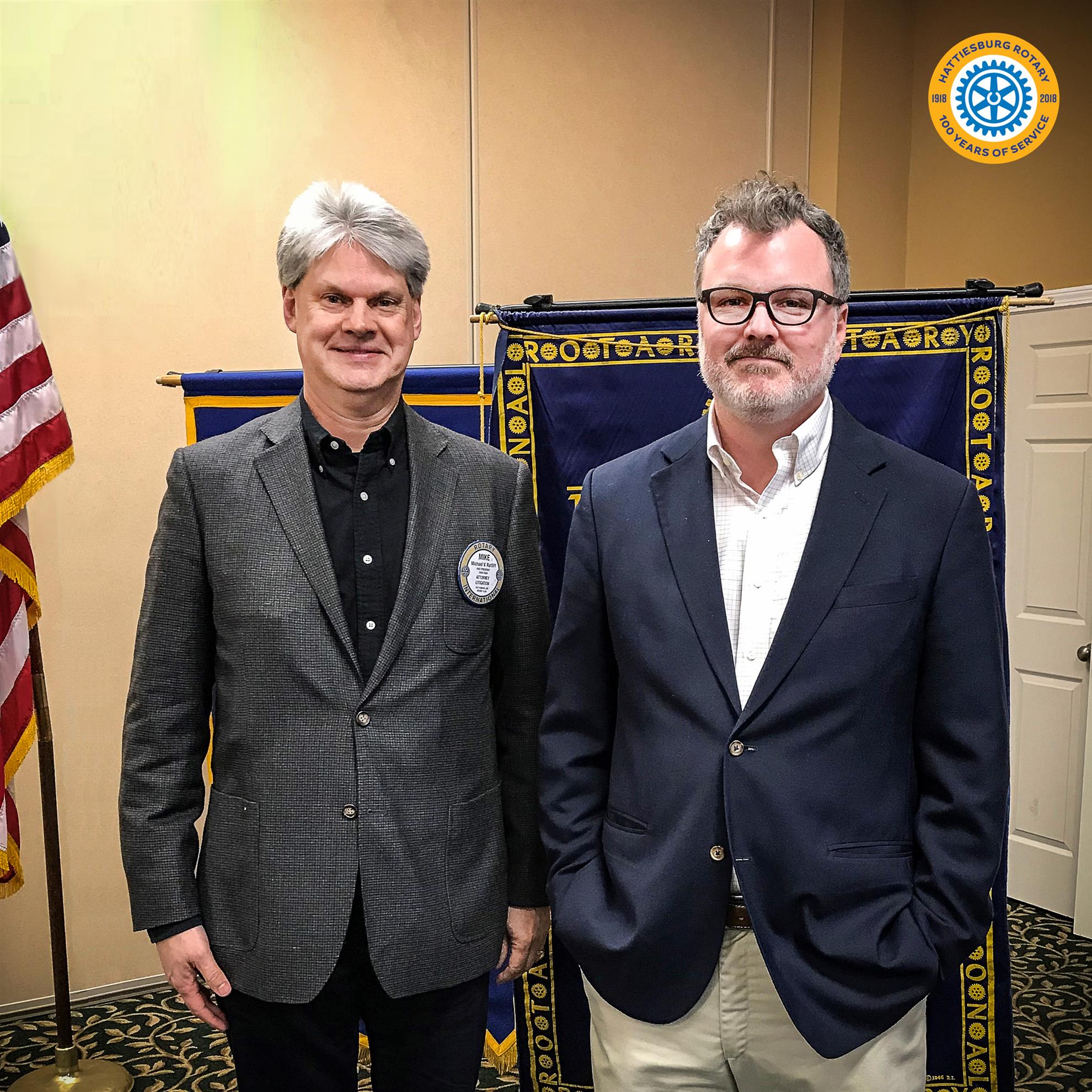President Paula Brahan presided over the meeting. Thanks to Steve Ramp who gave the invocation and to Mallory Donald who led us in the Pledge of Allegiance.
Mike Ratliff welcomed our visitors. Scott Hummel has five guests who are all William Carey business majors. They are Millie Byrd, Katelyn Grice, Trevon Cole, Nick Canner and Marshall Kuhn. Ernie Shows is a guest of Allen Anderson.

Our thanks to Dr. Kevin Greene for providing our program last week.
Kevin is joined here by Mike Ratliff.
Mike reported that long-time Rotarian Quentin Benedict passed away this weekend at the age of 99. He also reported that a College of Knowledge is scheduled for February 13. More details will be coming for Red Badge members and anyone else interested in gaining more information about Rotary.
Robert Cummings requested a few minutes of time to share information about the new tax laws that were recently passed. Employees who have been deducting un-reimbursed Employee Business Deductions on their Schedule A should be aware that those deductions go away after 2018. Anyone using those deductions should be aware and plan accordingly.
Paula reminded members that volunteers are needed for the Meals on Wheels program. Visit the website if you can help.
Bill Hughes reported that he ran into Conrad Welker and his wife Mary Virginia recently. Both seem to be doing well. Conrad wanted Bill to express his gratitude for the recent card sent by the club.
Lynn Walton was today’s fifty-fifty contest winner and received $35.
Kevin Greene, Ph.D. was our speaker today. His topic was Mississippi’s contribution to popular music. Dr. Greene is an assistant professor in the Department of History at the University of Southern Mississippi. He is also the Director of the Center for Oral History and Cultural Heritage.
The Mississippi car tag has a guitar in its center with the words “Birthplace of America’s Music” surrounding it. Greene says that is certainly true as evidenced by the fact that Mississippi was chosen as the site for the world’s second Grammy Museum. It is located in Cleveland, Mississippi. Why was Mississippi chosen as the Museum’s site? There are more Grammy recipients from Mississippi than any other place in the world.
Greene made a pilgrimage through Mississippi at the age of 23 where he realized the impact that Mississippi has had on art, music, and literature. He says Mississippi has always been on the front lines in all of these areas and is one of the most innovative places in the world.
The Blues emerged in the 1890’s and remained a strong influence in the lives of African Americans through the end of the depression. A very famous Mississippi Blues artist, Robert Johnson, is said to have sold his soul to the devil if he could have fame and fortune for seven years. According to legend, Johnson was at the Crossroads when he made the bargain. On his pilgrimage through, Mississippi Dr. Greene found that the crossroad location which is where Highways 61 and 49 intersect in the Mississippi Delta. Johnson’s unique guitar style and inventions are still in use in music throughout the world even today. As an example, Dr. Greene noted that Led Zeppelin uses Johnson’s techniques in almost every song they have produced.
B.B. King is another world-renowned Mississippi artist. He holds 15 Grammies. King also created a unique style of guitar play and has influenced music all over the world. He lived and worked in Indianola where he was a tractor driver and worked in a cotton gin. The B.B. King Museum in Indianola is located in that gin. Dr. Greene mentioned six other Mississippians who had a significant impact on the Blues.
Marty Robbins from Philadelphia, Mississippi, is also a well-known musician who has made significant contributions to country music. Robbins just recently opened his museum in Philadelphia. Jimmy Rodgers from Meridian, Mississippi, is known as the Father of Country Music. Rodgers was one of, if not the first, country music performer to tour nationally. Dr. Greene featured 4 other Mississippians who have made significant contributions to Country Music.
Among the six Mississippians, Greene featured in his Rock and Roll presentation included Sam Cooke from Clarksdale, Elvis Presley from Tupelo, and Jimmy Buffett who hales from the Gulf Coast. Greene also noted that the first Rock and Roll song ever recorded was done so by Blind Roosevelt Graves at the old Hattiesburg Hotel. Unfortunately, that building has been demolished.
Elvis, the King of Rock and Roll, is a cultural icon throughout the entire world. He is the only individual who has been inducted into 5 Halls of Fame. During his lifetime he produced 114 hit songs.
With no other business or announcement, Paula adjourned the meeting with our motto, “Service Above Self."